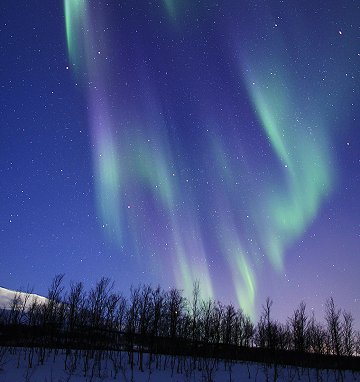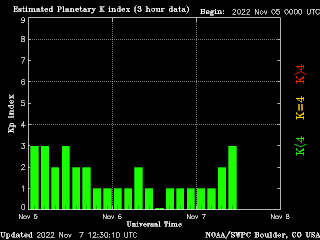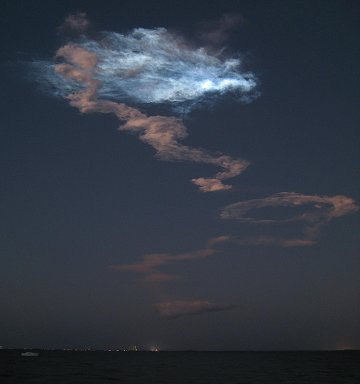DOUBLE FLYBY ALERT: Space shuttle Discovery is chasing the ISS
around Earth, and the two spacecraft are poised to fly over many
North American and European towns and cities tonight. Check the
Simple Satellite Tracker to see if you are
one of the lucky sky watchers favored with a "double flyby."
https://spaceweather.com/
SHUTTLE LAUNCH: Space shuttle Discovery left Earth on Sunday, March 15th, at 7:43
pm EDT in a beautiful twilight launch from Kennedy Space Center.
The orbiter is now en route to the International Space Station where
Commander Lee Archambault and crew will deliver and install the
outpost's final set of solar arrays. NASA Launch Director Mike Leinbach
said the countdown was smooth and the launch itself "was the
most visually beautiful I've ever seen -- it was just spectacular."
Shortly after the shuttle took off, an electric-blue cloud appeared
among the plumes of exhaust. Photographer Adam Bojanowski of Titusville,
Florida, recorded the formation:
"I compiled the pictures I took into a time
lapse movie," says Bojanowski. "The blue cloud appears
to grow where the shuttle main engines passed through a particular
layer of atmosphere. The cloud grew in coverage and changed from
bright white to electric blue as it expanded."
The cloud is probably made of ice crystals frozen
from the watery exhaust of the shuttle's main engines. Very tiny
crystals catching the rays of the setting sun would preferentially
scatter blue light, accounting for the cloud's distinctive color.
This is called Rayleigh
scattering--the same type of scattering that turns the daytime
sky blue.
more launch images: from
Terry Allshouse of Titusville, Florida; from
Stargazer Ron of Palm Bay, Florida; from
Chris Cook of Cape Cod, Massachusetts; from
Mary Lou Dolan of Coral Springs, Florida; from
Peter Lardizabal of St Johns, Florida; from
David Gray of Winter Haven, Florida; from
Arthur Stevens of Port Richey, Florida; from
Joshua Kitchener of Cape Coral, Florida;
AURORA WATCH: A solar wind stream hit Earth on March 13th, sparking colorful Northern
Lights around the Arctic Circle. Aurora tour guide Kjetil Skogli
sends this picture from Tromsø, Norway:

"The moonlight was very bright--but not bright enough to overwhelm
the aurora borealis," says Skogli. "There were several
outbursts, which I photographed using my Canon
5D."
Another solar wind stream is heading for Earth, due to arrive on
or about March 20th. Arctic sky watchers should
be alert for auroras on the first night of Spring
Current Moon Phase

Current Solar Data From NOAA 

Astronomy Picture of the Day NASA 
Astronomy Picture of the Day Archives
NASA Website

Thunderbolts Picture of the Day
Thunderbolts Archives Nasa shuttle launched after delay BBC - March 16, 2009
Nasa shuttle launched after delay BBC - March 16, 2009
How to find the Sun's long-lost siblings New Scientist - March 12, 2009
Gallery: the evolution of the spacesuit New Scientist - March 12, 2009
A 3-D view of remote galaxies PhysOrg - March 11, 2009  Spacewalkers Cut Away Station Straps Space.com - March 10, 2009
Spacewalkers Cut Away Station Straps Space.com - March 10, 2009  Climax of Venus on March 27th Space.com - March 10, 2009
Climax of Venus on March 27th Space.com - March 10, 2009
What is it like to live in isolation for months on end? New Scientist - March 10, 2009
Jupiter's great red spot is shrinking MSNBC - March 10, 2009
New Views of Martian Moon and Surface PhysOrg - March 10, 2009



